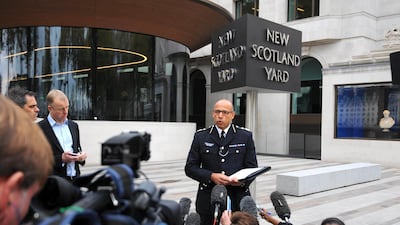The head of the UK's counter-terrorism police warned online extremism "cannot be policed" as Covid-19 is providing the "perfect storm" for terrorists.
Metropolitan Police assistant commissioner Neil Basu said action needs to be taken to prevent police being overwhelmed.
In its latest report, the UN’s counter-terrorism committee said nations needed to be aware that terrorist groups are exploiting the coronavirus pandemic and using online games in a bid to target children in lockdown.
The UN's Counter-Terrorism Committee Executive Directorate (CTED) revealed it had seen an increase in the online radicalisation of children and urged countries to be alert.
Mr Basu said extremism has become too widespread online and that the combination of lockdown, isolation, mental illness and increasing time spent online created a “perfect storm”.
"When you look at the volume of material which is horrific and shouldn't be allowed online, it is really distressing for a lot of people, the volume is so high it cannot be policed," he told The Independent newspaper. "It would have to be prevented and that is the most important thing."
The new Online Harms Bill, which proposes internet regulation that would force companies to remove material or face fines, is currently being considered by the UK parliament.
Mr Basu said this bill is “fundamental” to combating the issue.
“The thing that has always been my biggest concern is the growth of online radicalisation,” he said. “It has allowed conspiracy theories and existing Islamist and extreme right-wing terrorism, and all kinds of other single-issue terrorism, to thrive 24/7 internationally at the speed it takes to press a button.”
He said the "cure" to tackling terrorism is to stop radicalisation.
“The way to stop the very high threat is to stop people becoming terrorists in the first place," he said.
“Too much emphasis is on people coming out of prison, people returning from abroad and whether we can deradicalise them.
“That isn’t the cure for this. The cure for this is getting them before radicalisers really get to grips with them, and steering them to a different path.”
The country’s independent counter-extremism adviser, Sara Khan, said the government has still not responded to a report she published in October 2019 which criticised the current response to extremism as “inadequate” and “unfocused”, and demanded an overhaul of the system.
Ms Khan said the current strategy was “weak, disjointed and behind the curve” and that the system had to fundamentally change if the country was “going to deal with this huge growing problem of extremism”.
Appointed in 2018, Ms Khan’s work has focused on behaviour she has described as ‘hateful extremism’ that falls short of being prosecuted for terrorism but creates divisions in society and attempts to provide a moral justification for violence.
Police fear that such attitudes will develop into promoting terrorist acts.
Ms Khan launched a legal review in 2020 over concerns that there were gaps in the law that allowed extremists to push their agenda without punishment.
The Home Office has said it is still considering the Commission for Countering Extremism’s recommendations and will respond in due course.


